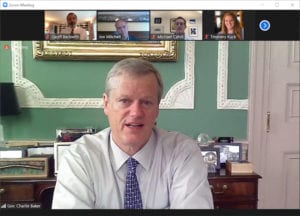Who is a member?
Our members are the local governments of Massachusetts and their elected and appointed leadership.
 Six months into the COVID-19 state of emergency, Gov. Charlie Baker and mayors from across the state lauded the value of a strong state-local partnership in helping Massachusetts quickly navigate from one of the hardest-hit states in the country to one of the safest.
Six months into the COVID-19 state of emergency, Gov. Charlie Baker and mayors from across the state lauded the value of a strong state-local partnership in helping Massachusetts quickly navigate from one of the hardest-hit states in the country to one of the safest.
During a Zoom conference call on Sept. 30, New Bedford Mayor Jon Mitchell thanked the governor, himself a former local official, for the administration’s “openness of communication” and recognizing that “not all the important levers of government, including in a crisis, are at the state level.”
“We just want to say we really appreciate the partnership,” he said. “This is all new to everybody, and we’re working our way through. And I think we’re setting an example here in Massachusetts that shines across the country.”
Calling the pandemic “the biggest challenge of my professional career,” Gov. Baker added, “I think the work that you’ve all done as a collective community to keep people engaged – in a good way – has made a really big difference with respect to how folks have responded to this incredible challenge.”
The governor gave an update on a range of COVID-related issues, including the state’s nation-leading testing program, featuring Stop the Spread, and its model contact tracing program, which quickly reaches out to those who’ve been in contact with a positive case in an effort to limit the spread of the disease. Baker said more than 70% of COVID-positive individuals are reached within 24 hours of their test result, and 95% are reached within 48 hours.
Discussing the red, yellow and green designations representing COVID risk level that the state began assigning to communities in weekly reports in August, the governor stressed that it’s important to watch trends and not react to a single report.
“What we really felt, in the end, we had to do was put the data out as it is and then … let the local communities figure out – based on what their boards of health know and what they know about their own community – what’s really going on there,” he said. “You’ve really got to look at three reporting periods, which captures four weeks of data, before you start drawing conclusions about what it says and where it’s going. … We’ve had communities go up … because they had one bad event, or a nursing home or something like that had an outbreak, [and then quickly come back down].”
He said the reports are important to show that communities are having different experiences due to COVID. It also reminds people, particularly in yellow and red communities, not to let their guard down.
He said roughly 2.2 million people have been tested in Massachusetts – including a recent spike due to the return of college students – and 4 million tests have been administered.
The governor, who spent a good portion of his career in the health insurance field, said he was confident about the development and efficient distribution of a COVID vaccine, likely in the first half of next year. As difficult as this period has been, he reminded mayors that the pandemic will end at some point. In the meantime, he said, the state has continued to stockpile PPE supplies.
On other topics, Gov. Baker asked mayors to urge legislators to support an economic development bond bill that’s currently in a legislative conference committee – a bill that he said would go a long way toward helping small businesses recover from the COVID recession.
He said he’s optimistic about having a final state budget for fiscal 2021 this fall, but it’s still too early to predict what fiscal 2022 might look like.
Facing the expiration of the state’s eviction moratorium on Oct. 17, he said the administration is working with representatives in the court system and housing advocates “to create a process that looks a little different than the traditional court process for dealing with evictions,” with the ultimate goal of keeping people in their homes.
As the weather turns colder, and while COVID is limiting capacity at homeless shelters (due to distancing measures), he said the administration is working hard on plans to protect the homeless this winter.